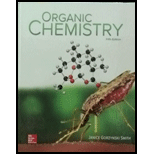
Concept explainers
(a)
Interpretation: The glycosidic linkages of the stachyose are to be labeled.
Concept introduction: Monosaccharides are the small units of simple sugars. Polysaccharides are made up of small units of monosaccharides. These small units are joined together by glycoside linkage.
Answer to Problem 28.66P
The red colored oxygen atoms are a part of glycosic linkages as hown below.
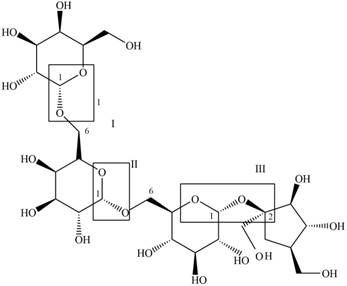
Figure 1
Explanation of Solution
The structure of stachyose,
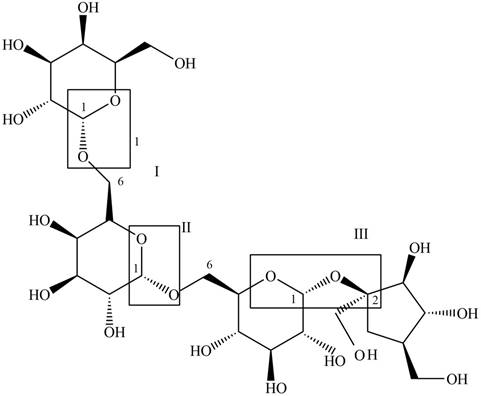
Figure 1
The acetals containing alkoxy groups attached to anomeric carbons in the stachyose represent the glycosidic linkages. The red colored oxygen atoms are a part of glycosic linkages.
The glycosidic linkages of the stachyose are shown in Figure 1.
(b)
Interpretation: Each glycosidic linkages of the stachyose are to be classified as
Concept introduction: Monosaccharides are the small units of simple sugars. Polysaccharides are made up of small units of monosaccharides. These small units are joined together by glycoside linkage.
Answer to Problem 28.66P
The glycosidic linkage
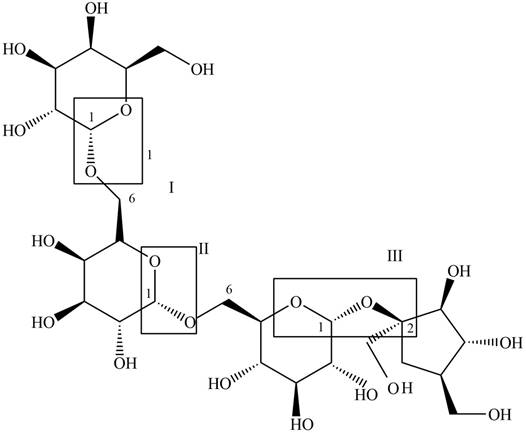
Figure 1
Explanation of Solution
The structure of stachyose,
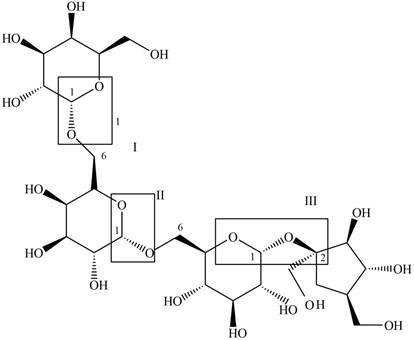
Figure 1
The glycosidic linkages which are composed of alkoxy group above the plane are
The glycosidic linkage
(c)
Interpretation: The products formed on hydrolysis of stachyose are to be predicted.
Concept introduction: Glycosidic linkages are hydrolyzed in presence of acid to form cyclic hemiacetal and corresponding alcohol. Acetals in the presence of acid undergo hydrolysis to form cyclic hemiacetals.
Answer to Problem 28.66P
The products formed on hydrolysis of stachyose are,
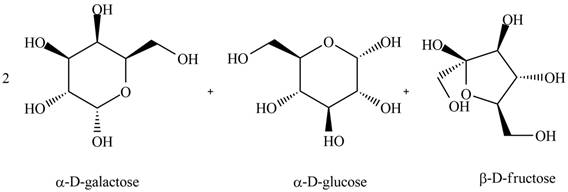
Figure 2
Explanation of Solution
On acidic hydrolysis of stachyose, the glycosidic linkages are cleaved to form the four products. The corresponding
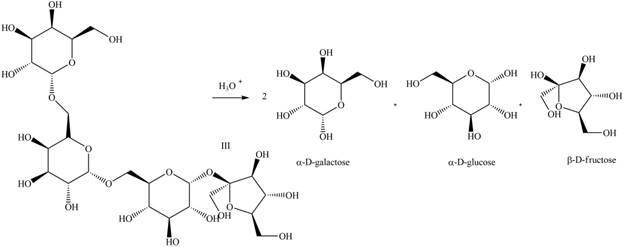
Figure 3
The products formed are
(d)
Interpretation: The validation to the corresponding fact that whether stachyose is reducing sugar or not is to be stated.
Concept introduction: The reducing sugars contain hemiacetal and they undergo mutarotation. These sugars are in equilibrium with cyclic monosaccharide forms.
Answer to Problem 28.66P
Stachyose is not a reducing sugar.
Explanation of Solution
The given tetrasaccharide stachyose does not contain any hemiacetal and does not undergo mutarotation. Thus, the given tetrasaccharide is not a reducing sugar.
The product formed on treatment of stachyose with excess
(e)
Interpretation: The product formed on treatment of stachyose with excess
Concept introduction: The hydroxyl groups of monosaccharides are converted into the ether groups in presence of base and
Answer to Problem 28.66P
The product formed on treatment of stachyose with excess
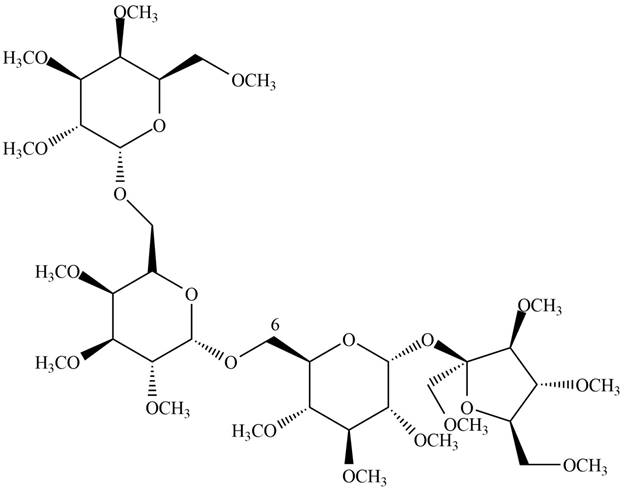
Figure 4
Explanation of Solution
On treatment of stachyose with excess
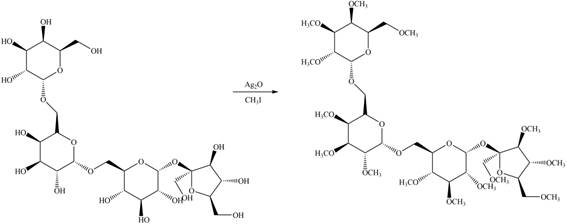
Figure 5
The product formed on treatment of stachyose with excess
(f)
Interpretation: The product formed on treatment of product in (e) with
Concept introduction: Glycosidic linkages are hydrolyzed in presence of acid to form cyclic hemiacetal and corresponding alcohol. Acetals in the presence of acid undergo hydrolysis to form cyclic hemiacetals.
Answer to Problem 28.66P
The products formed on treatment of product in (e) with
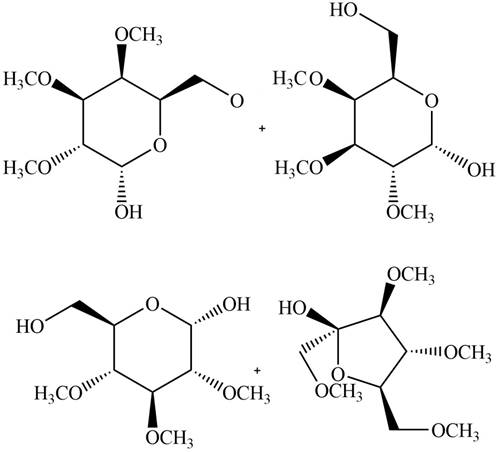
Figure 6
Explanation of Solution
On acidic hydrolysis of the given compound, the glycosidic linkages are cleaved to form the four products. The corresponding chemical reaction is shown below.
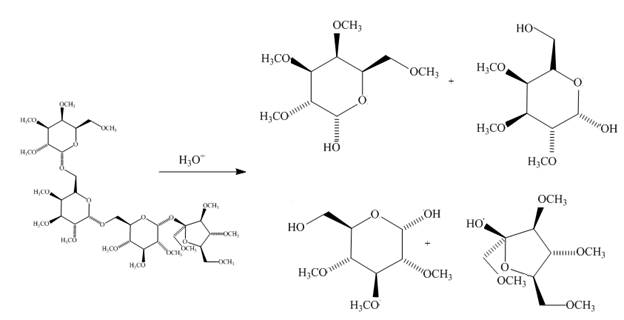
Figure 7
The products formed on treatment of product in (e) with
Want to see more full solutions like this?
Chapter 28 Solutions
Organic Chemistry
- ● Biological Macromolecules Identifying the parts of a disaccharide Take a look at this molecule, and then answer the questions in the table below it. CH2OH O H H H OH OH OH H H CH2OH H O OH H OH H H H H OH Is this a reducing sugar? Does this molecule contain a glycosidic bond? If you said this molecule does contain a glycosidic bond, write the symbol describing it. If you said this molecule does contain a glycosidic bond, write the common names (including anomer and enantiomer labels) of the molecules that would be released if that bond were hydrolyzed. If there's more than one molecule, separate each name with a comma. Explanation Check O yes X O no ○ yes O no Uarrow_forwardThe aim of the lab is to measure the sodium content from tomato sauce using the Mohr titration method. There are two groups being: Regular Tomato sauce & Salt Reduced tomato sauce QUESTION: State how you would prepare both Regular & Salt reduced tomato sauce samples for chemical analysis using the Mohr titration methodarrow_forwardUsing the conditions of spontaneity to deduce the signs of AH and AS Use the observations about each chemical reaction in the table below to decide the sign (positive or negative) of the reaction enthalpy AH and reaction entropy AS. Note: if you have not been given enough information to decide a sign, select the "unknown" option. reaction observations conclusions A The reverse of this reaction is always spontaneous but proceeds faster at temperatures above -48. °C. ΔΗ is (pick one) ✓ AS is (pick one) B This reaction is spontaneous except below 114. °C but proceeds at a slower rate below 135. °C. ΔΗ is (pick one) AS is (pick one) ΔΗ is C This reaction is exothermic and proceeds faster at temperatures above -43. °C. (pick one) AS is (pick one) v Х 5 ? 18 Ararrow_forward
- ion. A student proposes the following Lewis structure for the perchlorate (CIO) io : :0: : Cl : - - : :0: ك Assign a formal charge to each atom in the student's Lewis structure. atom central O formal charge ☐ top O ☐ right O ☐ bottom O ☐ Cl ☐arrow_forwardDecide whether these proposed Lewis structures are reasonable. proposed Lewis structure Yes. Is the proposed Lewis structure reasonable? Cl- : 2: :Z: :Z: N—N : 0: C C1: O CO No, it has the wrong number of valence electrons. The correct number is: ☐ No, it has the right number of valence electrons but doesn't satisfy the octet rule. The symbols of the problem atoms are:* ☐ Yes. No, it has the wrong number of valence electrons. The correct number is: ☐ No, it has the right number of valence electrons but doesn't satisfy the octet rule. The symbols of the problem atoms are:* | Yes. No, it has the wrong number of valence electrons. The correct number is: No, it has the right number of valence electrons but doesn't satisfy the octet rule. The symbols of the problem atoms are:* | If two or more atoms of the same element don't satisfy the octet rule, just enter the chemical symbol as many times as necessary. For example, if two oxygen atoms don't satisfy the octet rule, enter "0,0". ☑arrow_forwardUse the observations about each chemical reaction in the table below to decide the sign (positive or negative) of the reaction enthalpy AH and reaction entropy AS. Note: if you have not been given enough information to decide a sign, select the "unknown" option. reaction observations conclusions ΔΗ is (pick one) A This reaction is faster above 103. °C than below. AS is (pick one) ΔΗ is (pick one) B This reaction is spontaneous only above -9. °C. AS is (pick one) ΔΗ is (pick one) C The reverse of this reaction is always spontaneous. AS is (pick one) 18 Ararrow_forward
- Use the observations about each chemical reaction in the table below to decide the sign (positive or negative) of the reaction enthalpy AH and reaction entropy AS. Note: if you have not been given enough information to decide a sign, select the "unknown" option. reaction observations conclusions A The reverse of this reaction is always spontaneous but proceeds slower at temperatures below 41. °C. ΔΗ is (pick one) AS is (pick one) ΔΗ is (pick one) B This reaction is spontaneous except above 94. °C. AS is (pick one) This reaction is always spontaneous, but ΔΗ is (pick one) C proceeds slower at temperatures below −14. °C. AS is (pick one) Х 00. 18 Ar 무ㅎ B 1 1arrow_forwardDraw the product of the reaction shown below. Ignore inorganic byproducts. + H CH3CH2OH HCI Drawingarrow_forwardplease explain this in simple termsarrow_forward
- K Most Reactive Na (3 pts) Can the metal activity series (shown on the right) or a standard reduction potential table explain why potassium metal can be prepared from the reaction of molten KCI and Na metal but sodium metal is not prepared from the reaction of molten NaCl and K metal? Show how (not). Ca Mg Al с Zn Fe Sn Pb H Cu Ag Au Least Reactivearrow_forward(2 pts) Why is O2 more stable as a diatomic molecule than S2?arrow_forwardDraw the Lewis structure for the polyatomic phosphite (PO¾³¯) a anion. Be sure to include all resonance structures that satisfy the octet rule. C I A [ ]¯arrow_forward
 Introductory Chemistry: An Active Learning Approa...ChemistryISBN:9781305079250Author:Mark S. Cracolice, Ed PetersPublisher:Cengage Learning
Introductory Chemistry: An Active Learning Approa...ChemistryISBN:9781305079250Author:Mark S. Cracolice, Ed PetersPublisher:Cengage Learning Introductory Chemistry: A FoundationChemistryISBN:9781337399425Author:Steven S. Zumdahl, Donald J. DeCostePublisher:Cengage Learning
Introductory Chemistry: A FoundationChemistryISBN:9781337399425Author:Steven S. Zumdahl, Donald J. DeCostePublisher:Cengage Learning Introduction to General, Organic and BiochemistryChemistryISBN:9781285869759Author:Frederick A. Bettelheim, William H. Brown, Mary K. Campbell, Shawn O. Farrell, Omar TorresPublisher:Cengage Learning
Introduction to General, Organic and BiochemistryChemistryISBN:9781285869759Author:Frederick A. Bettelheim, William H. Brown, Mary K. Campbell, Shawn O. Farrell, Omar TorresPublisher:Cengage Learning- Chemistry: Matter and ChangeChemistryISBN:9780078746376Author:Dinah Zike, Laurel Dingrando, Nicholas Hainen, Cheryl WistromPublisher:Glencoe/McGraw-Hill School Pub Co
 Chemistry for Today: General, Organic, and Bioche...ChemistryISBN:9781305960060Author:Spencer L. Seager, Michael R. Slabaugh, Maren S. HansenPublisher:Cengage Learning
Chemistry for Today: General, Organic, and Bioche...ChemistryISBN:9781305960060Author:Spencer L. Seager, Michael R. Slabaugh, Maren S. HansenPublisher:Cengage Learning ChemistryChemistryISBN:9781305957404Author:Steven S. Zumdahl, Susan A. Zumdahl, Donald J. DeCostePublisher:Cengage Learning
ChemistryChemistryISBN:9781305957404Author:Steven S. Zumdahl, Susan A. Zumdahl, Donald J. DeCostePublisher:Cengage Learning





